Drinking herbal teas can really enhance your blood flow and boost your circulatory health. Ingredients like ginger and ginkgo biloba stimulate blood circulation and dilate blood vessels. These teas are packed with antioxidants, reduce inflammation, and even help regulate blood pressure. Not only does sipping on herbal tea support your heart, but it also offers a calming ritual that helps reduce stress. Whether it's a morning boost or an evening relaxer, there's a perfect tea for every time of day. Curious about which blends work best for your needs? You might discover even more benefits ahead.
Benefits of Herbal Teas
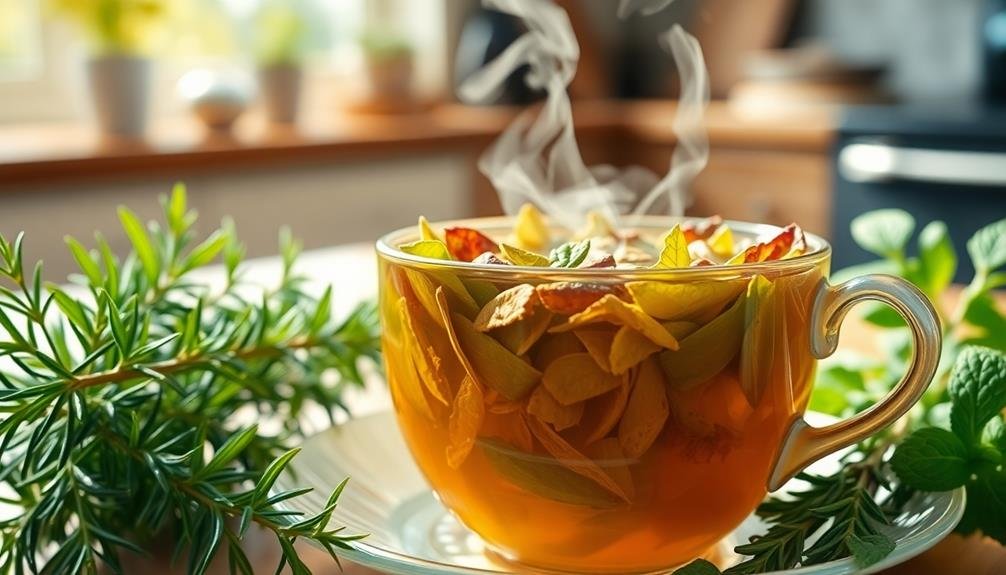
Herbal teas offer a range of benefits that can enhance your overall health, especially when it comes to blood flow. When you sip on these soothing brews, you're not just treating yourself to a warm drink; you're also supporting your circulatory system. Many herbal teas contain compounds that help relax your blood vessels, allowing for improved circulation. This can lead to better oxygen delivery to your organs and tissues, making you feel more energized throughout the day.
Additionally, herbal teas are often rich in antioxidants, which combat oxidative stress in your body. By reducing inflammation and promoting healthy blood vessel function, you're setting the stage for better cardiovascular health. You might also find that herbal teas help regulate your blood pressure, making them a smart choice for maintaining a healthy heart.
Moreover, enjoying a cup of herbal tea can be a calming ritual, helping to reduce stress levels. Lower stress means less strain on your heart, further enhancing your overall wellness.
Key Ingredients for Circulation
When it comes to boosting circulation, ginger and ginkgo biloba stand out as powerful ingredients.
Ginger's warmth can stimulate blood flow, while ginkgo biloba is known for enhancing circulation and cognitive function.
Incorporating these herbs into your herbal tea can really make a difference in your overall vascular health.
Ginger's Circulatory Benefits
Ginger is a powerhouse for enhancing blood circulation. When you incorporate ginger into your diet or herbal tea routine, you're tapping into a natural remedy known for its ability to stimulate blood flow. The active compounds in ginger, such as gingerol and shogaol, work to dilate blood vessels, making it easier for your heart to pump blood throughout your body.
Consuming ginger can also help reduce inflammation, which is essential for maintaining healthy circulation. Inflammation can constrict blood vessels and hinder blood flow, but ginger's anti-inflammatory properties can counteract this effect. By adding ginger to your teas, you're not just enjoying a warm beverage; you're actively promoting better circulation.
Moreover, ginger may help lower cholesterol levels, further supporting heart health. This can lead to improved overall circulation and reduced risk of cardiovascular issues.
Whether you enjoy it fresh, in powdered form, or as a tea, ginger can be a simple yet effective addition to your wellness routine. Incorporate ginger into your herbal teas, and you'll be well on your way to enhancing your blood flow and enjoying its myriad health benefits.
Ginkgo Biloba Effects
Ginkgo biloba is another powerful ally in promoting healthy circulation. This ancient herb has been used for centuries, and you might find its effects on blood flow particularly beneficial. Ginkgo works by dilating blood vessels and improving blood flow, especially to the extremities. This can help enhance oxygen delivery throughout your body, which is vital for overall health.
When you incorporate ginkgo biloba into your diet, whether through tea or supplements, you may experience improved cognitive function and reduced symptoms of fatigue. It's believed that ginkgo can help alleviate symptoms related to poor circulation, such as cold hands and feet, by increasing circulation to these areas.
Moreover, ginkgo is known for its antioxidant properties, which combat oxidative stress and may contribute to better cardiovascular health.
If you're looking to improve your circulation naturally, consider adding ginkgo biloba to your herbal tea repertoire. Just remember to consult with a healthcare professional before starting any new supplement, especially if you're on medication or have underlying health conditions. By doing so, you can guarantee that ginkgo is a safe and effective choice for enhancing your blood flow.
Popular Herbal Tea Blends
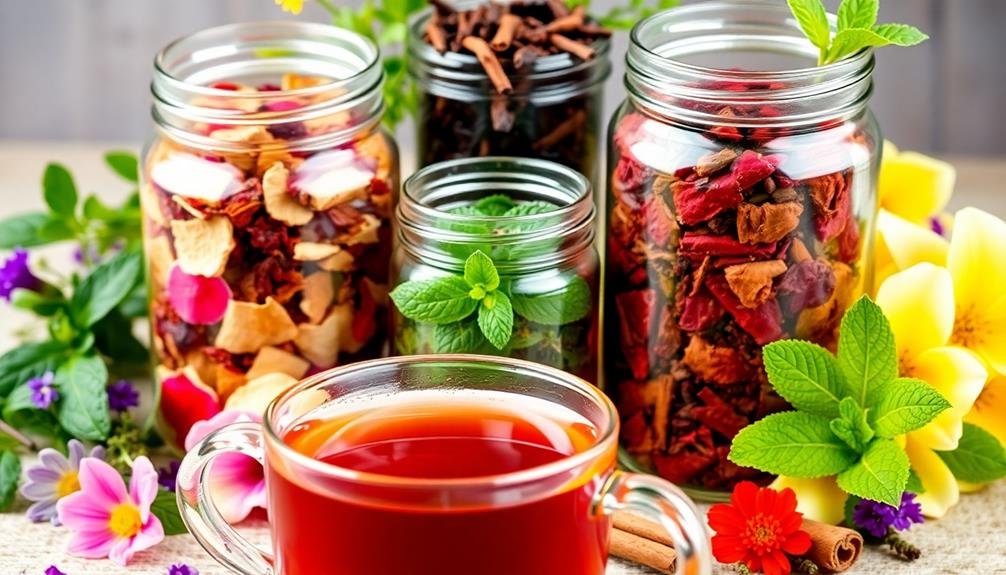
Herbal tea blends offer a delightful way to boost circulation and promote better blood flow. You'll find that combining various herbs can enhance their individual benefits, creating a powerful drink for your health.
One popular blend is ginger and turmeric. Ginger warms the body, while turmeric's anti-inflammatory properties support overall circulation. Together, they make a spicy, invigorating tea.
Another fantastic option is hibiscus and cinnamon. Hibiscus is known for lowering blood pressure, and cinnamon can improve circulation. This blend not only tastes great but also provides a rejuvenating way to enhance your cardiovascular health.
You might also enjoy a blend of peppermint and nettle. Peppermint stimulates blood flow and has a cooling effect, while nettle is rich in vitamins and minerals that support vascular health.
Lastly, consider a combination of rooibos and ginkgo biloba. Rooibos is caffeine-free and packed with antioxidants, while ginkgo biloba has been shown to improve circulation further.
How to Prepare Herbal Teas
Preparing your herbal tea blends is a straightforward process that allows you to fully enjoy the benefits of the ingredients you've chosen.
Start by selecting your herbs and ensuring they're fresh or properly dried. Here's a simple method to get you started:
- Measure the Ingredients: Use about one teaspoon of dried herbs or one tablespoon of fresh herbs per cup of water. Adjust based on your taste preference.
- Boil Water: Bring water to a rolling boil, then let it cool slightly if you're using delicate herbs, which can lose flavor when exposed to high heat.
- Steep: Pour the hot water over your herbs in a teapot or cup. Cover it to keep the heat in, and steep for about 5 to 10 minutes, depending on how strong you want your tea.
Once steeped, strain the herbs and enjoy your herbal tea.
You can also experiment with different combinations and add sweeteners or lemon for extra flavor.
With practice, you'll discover your perfect blend for better blood flow!
Best Times to Drink
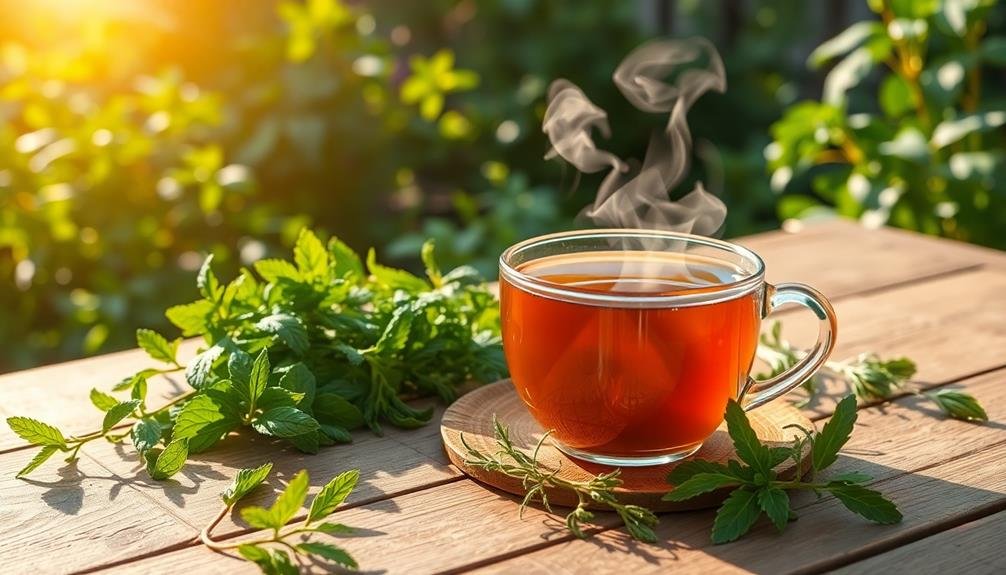
Knowing when to sip your herbal teas can enhance their benefits.
Enjoy a cup in the morning for an energizing boost, drink before your workout to improve performance, and unwind with a warm brew in the evening to relax.
Timing your tea can make a real difference in how you feel throughout the day.
Morning Boost Benefits
Many people find that starting their day with a warm cup of herbal tea can greatly enhance their morning routine. Not only does it provide hydration, but herbal tea can also boost your energy and mental clarity. The right herbal blends can set a positive tone for your day ahead.
Consider incorporating herbal teas into your morning for these benefits:
- Increased Alertness: Teas like peppermint or ginseng can help wake you up and sharpen your focus.
- Reduced Stress: Chamomile or lemon balm may help you feel calmer, allowing you to approach your day with a more balanced mindset.
- Improved Digestion: Ginger or fennel teas can stimulate digestion, making you feel lighter and more energetic.
Drinking herbal tea in the morning doesn't just hydrate you; it also offers a variety of health benefits that can improve your overall well-being.
Pre-Workout Performance
If you're looking to enhance your workout routine, timing your herbal tea consumption can make a significant difference. Drinking herbal tea about 30 to 60 minutes before your workout can boost your blood flow, helping you perform at your best.
Teas like ginger or ginkgo biloba are particularly effective, as they promote circulation and warm up your muscles.
It's essential to choose the right tea for your pre-workout needs. For instance, if you want a gentle energy lift, consider green tea. It's packed with antioxidants and can help increase endurance without the jitters that coffee often brings.
On the other hand, if you're aiming for a more intense workout, hibiscus tea can be beneficial, as it may help lower blood pressure and improve oxygen flow.
Remember to stay hydrated, too. Herbal tea can contribute to your fluid intake, but make sure it's not your only source of hydration.
Evening Relaxation Rituals
As the day winds down, sipping herbal tea can be a soothing way to shift into a relaxing evening. Choosing the right time to enjoy your tea can enhance its calming effects, making it a perfect addition to your nightly routine.
Consider these ideal moments to indulge:
- Post-Dinner: Allow your body to digest while enjoying a cup of chamomile or peppermint, which can help ease any gastrointestinal discomfort.
- Before Bed: Opt for calming blends like lavender or valerian root to promote better sleep. This helps signal to your body that it's time to unwind.
- During Wind-Down Activities: Whether you're reading a book or practicing meditation, having a warm cup of tea in hand can deepen your relaxation experience.
Potential Side Effects
Herbal teas can offer a variety of health benefits, but it's vital to be aware of their potential side effects. While many people enjoy these beverages without issues, some individuals may experience adverse reactions. For instance, certain herbs can lead to allergic reactions, causing symptoms like itching, swelling, or difficulty breathing. If you're sensitive to specific plants, it's important to research the ingredients in your herbal tea.
Additionally, some herbal teas may interact with medications. For example, teas containing ginseng can affect blood sugar levels, while others, like chamomile, can act as blood thinners. If you're on medication or have underlying health conditions, consult your healthcare provider before adding new herbal teas to your routine.
Another concern is caffeine content. While many herbal teas are caffeine-free, some blends may contain ingredients like yerba mate or guarana, which can lead to jitteriness or insomnia if consumed in excess.
Combining With Other Remedies
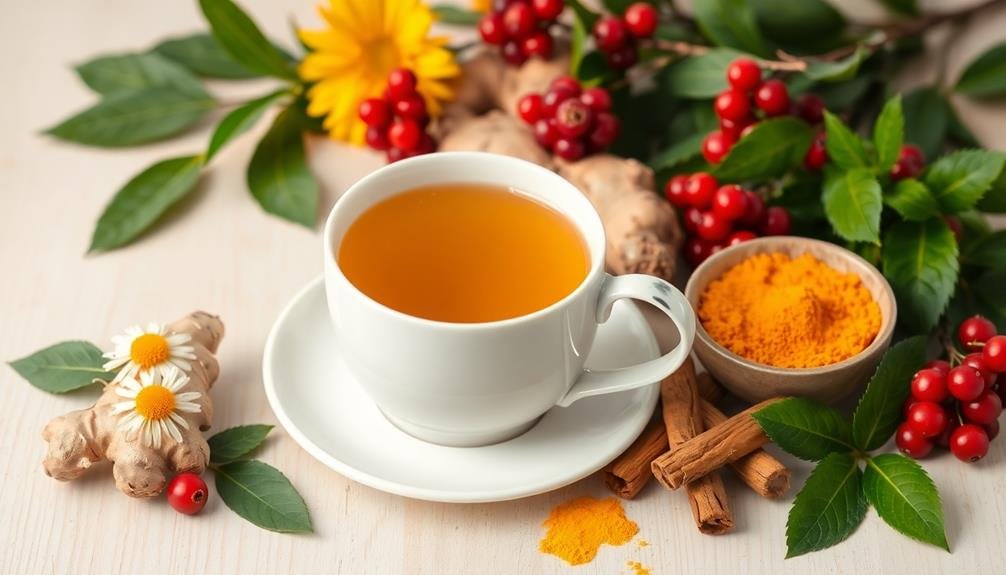
Combining herbal teas with other remedies can enhance their benefits and promote better blood flow. When you pair herbal teas with ingredients that support circulation, you create a powerful blend that can optimize your health.
Here are a few remedies you might consider:
- Cayenne Pepper: Known for its ability to improve circulation, adding a pinch to your herbal tea can give it a spicy kick and boost blood flow.
- Ginger: This warming root not only adds flavor but also has anti-inflammatory properties that can help improve circulation when infused with your favorite tea.
- Cinnamon: This aromatic spice can enhance the flavor of your tea while potentially helping to regulate blood sugar levels, which in turn can support healthy circulation.
Experimenting with these combinations can lead to delicious and health-promoting beverages.
Just remember to listen to your body and consult with a healthcare professional if you have any concerns about interactions or side effects.
Tips for DIY Blends
Creating your own herbal tea blends can be a fun and rewarding way to enhance circulation while enjoying unique flavors. To get started, select herbs known for their circulatory benefits, like ginger, ginkgo biloba, or cayenne. You can mix and match to discover your ideal combination.
Here are some tips for crafting your blends:
| Herb | Benefit | Flavor Profile |
|---|---|---|
| Ginger | Boosts blood flow | Spicy and warming |
| Ginkgo Biloba | Improves circulation | Earthy and slightly bitter |
| Cayenne | Increases circulation | Hot and pungent |
| Hibiscus | Lowers blood pressure | Tart and fruity |
| Peppermint | Enhances blood flow | Cool and invigorating |
Start with a base of one to two primary herbs, then add complementary flavors. Experiment with proportions; a good starting point is one part of the primary herb to one-half part of the secondary herb. Don't forget to taste as you go! Once you find a blend you love, steep it in hot water for 5-10 minutes, and enjoy the benefits of your homemade herbal tea.
Frequently Asked Questions
Can Herbal Teas Replace Medications for Circulation Issues?
Herbal teas can support circulation but shouldn't replace medications without consulting your doctor. They can complement your treatment, offering additional benefits, but it's important to maintain your prescribed regimen for ideal health management.
How Do Herbal Teas Compare to Coffee for Blood Flow?
When comparing herbal teas to coffee for blood flow, you'll find herbal teas often promote better circulation without caffeine's jitters. They can relax blood vessels, while coffee may constrict them, impacting overall circulation differently.
Are There Specific Herbal Teas for Diabetics?
Yes, specific herbal teas like chamomile, cinnamon, and ginger can benefit diabetics. They may help stabilize blood sugar levels and improve overall health. Just be sure to consult your healthcare provider before trying new options.
Can I Drink Herbal Teas While Pregnant?
Yes, you can drink herbal teas while pregnant, but it's essential to choose safe options. Always check with your healthcare provider first to verify the herbs you select won't harm you or your baby.
How Long Does It Take to See Effects on Circulation?
You'll typically notice improvements in circulation within a few weeks of consistent herbal tea consumption. However, individual results can vary based on factors like your overall health, lifestyle, and specific herbs used.
In Summary
Incorporating herbal teas into your daily routine can greatly enhance your blood flow and overall health. With their rich array of beneficial ingredients, these teas not only taste great but also offer natural support for circulation. By experimenting with different blends and preparation methods, you can find what works best for you. Just be mindful of potential side effects and consider combining them with other remedies for ideal results. Cheers to better circulation and well-being!

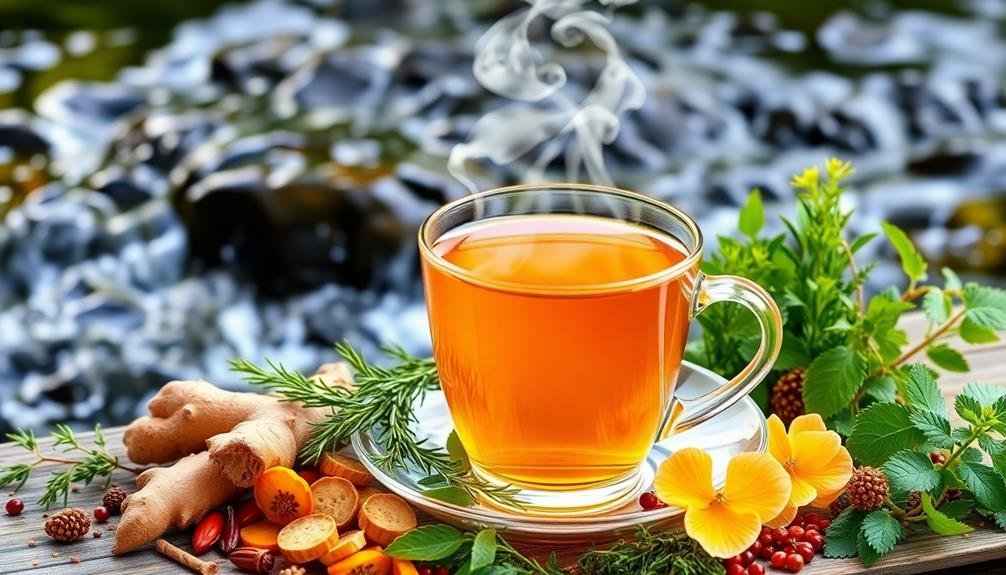
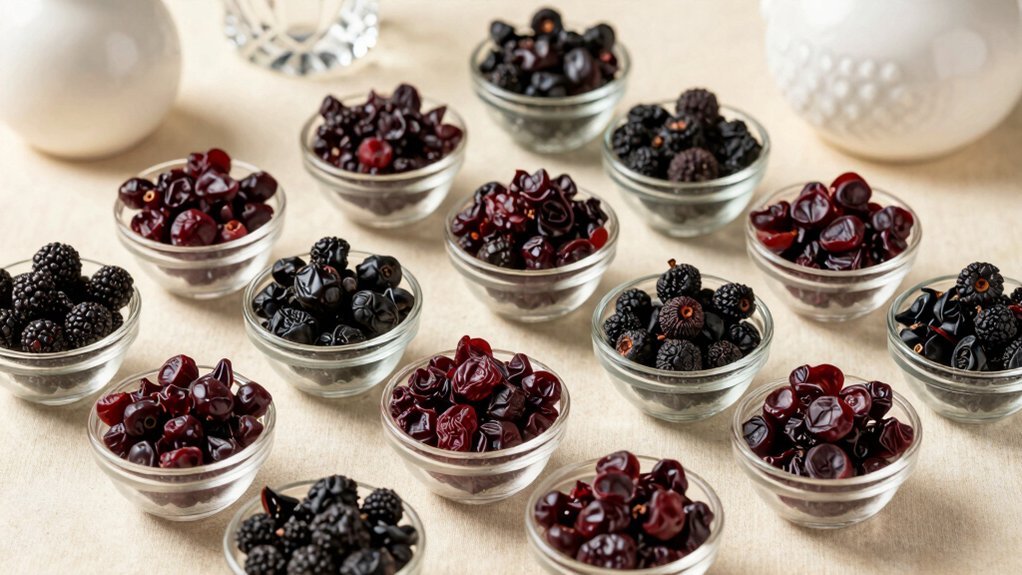
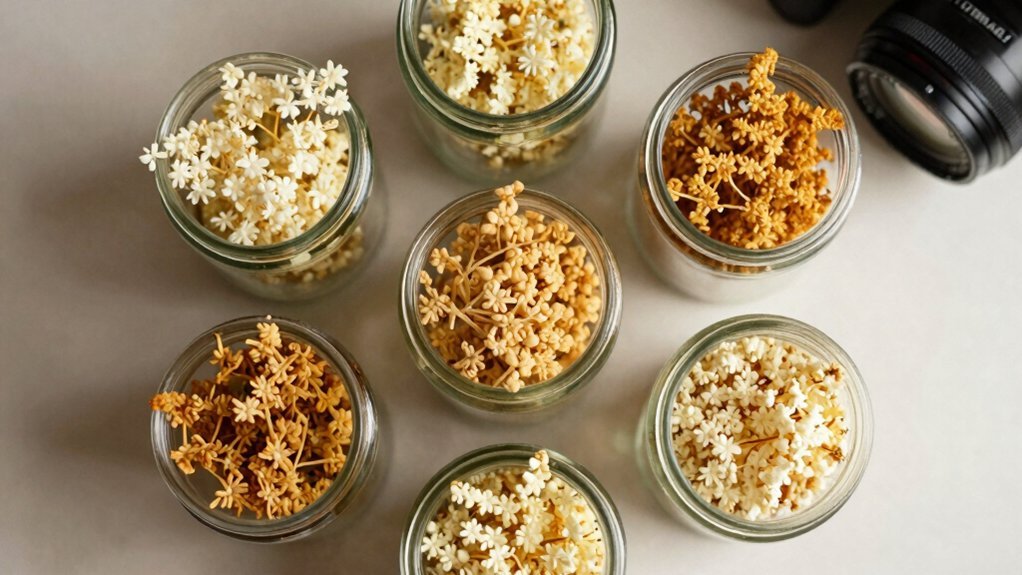
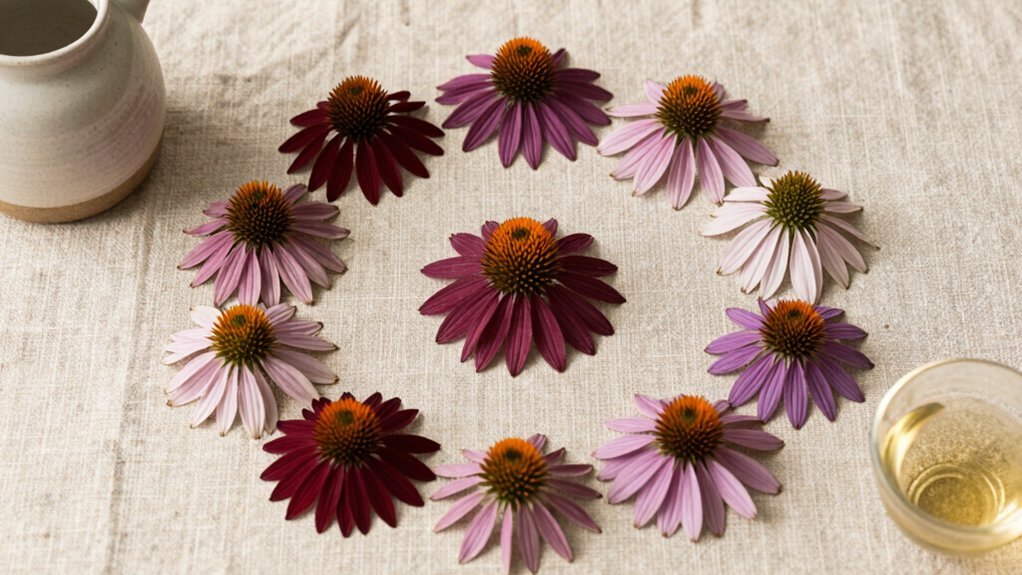
Leave a Reply